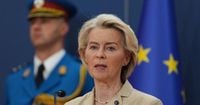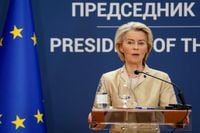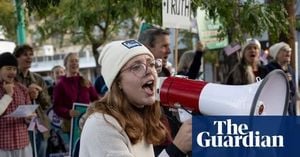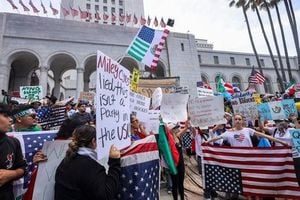On October 15, 2025, the political heart of Serbia beat faster as European Commission President Ursula von der Leyen arrived in Belgrade for a pivotal meeting with Serbian President Aleksandar Vučić. The visit, marked by both optimism and pointed demands, underscored the European Union’s expectations for Serbia’s long-anticipated accession and the pressing reforms still required for the Balkan nation to realize its EU ambitions.
Standing side by side at the Palace of Serbia, Von der Leyen delivered a message that was equal parts encouragement and challenge. “Now is the moment for Serbia to get concrete about joining our Union,” she declared, as reported by Balkan Insight. Her words set the tone for a day focused on the future of Serbia’s relationship with the EU—a future that, she insisted, hinges on tangible progress in key areas: the rule of law, the electoral framework, and media freedom.
“We live in a fractured world. With a widening gap between democracies and autocracies. You know very well where the EU stands. We stand for freedom instead of oppression, including the right of peaceful assembly. Partnership instead of submission. Diplomacy instead of aggression,” Von der Leyen told reporters, according to Beta. Her remarks echoed the EU’s core values and its vision for Serbia’s place within the European family.
Serbia’s path toward EU membership has been anything but straightforward. Nearly two decades ago, the country set its sights on joining the Union—a decision Von der Leyen described as “not only a strategic choice. It was also a choice of the heart. It was the demand of the people of Serbia.” Yet, as she noted, the journey has been long, and the road ahead remains demanding.
Her visit came at a moment of heightened political tension in Serbia. Months of anti-government protests, led by students and initially sparked by the tragic November 2024 Novi Sad railway station disaster that claimed 16 lives, have swept the country. The demonstrators now focus on demands for early elections—a call President Vučić has firmly rejected. When pressed about the government’s handling of the protests and allegations of heavy-handed policing, Vučić defended his administration, stating, “I am proud of the democratic commitment and behaviour of the Serbian state regarding the protests.” He went further, boasting, “Serbia is the champion of the world in terms of freedom of assembly, where you have over 25,000 criminal or illegal unauthorised assemblies that we guarded, secured and took care of the people who held them illegally,” as cited by Balkan Insight.
Von der Leyen, for her part, was clear about the EU’s stance: “The EU’s position is about freedom, not repression, including the right to peaceful assembly,” she said, according to Beta. She called this “a crucial moment for Serbia” and urged all citizens to come together to strengthen the foundations of democracy. “The European Union is ready to support you and make every effort necessary in this regard,” she added, emphasizing that reforms must include all parts of society and the political spectrum.
Progress, however, is not just about words—it’s about action. Von der Leyen welcomed recent steps forward, particularly on the unified voter register and the REM Council, Serbia’s media regulatory authority. She noted, “I noticed the efforts made by all to work together, including the civil society and the opposition. This is a good first step, of course. Now implementation is key,” she said, inviting Vučić to Brussels in about a month to take stock together.
Behind the scenes, Serbia’s parliament has been busy. The Committee on Culture and Information recently adopted the list of candidates for the REM Council, though the full parliament has yet to discuss and elect them. On the issue of voter lists, opposition parties and civil society groups have submitted proposals for a new Law on a Unified Voter List, claiming their versions better meet the recommendations of the Organization for Security and Co-operation in Europe’s Office for Democratic Institutions and Human Rights (ODIHR). Government MPs have since proposed a new draft law, reportedly accepted by non-governmental organizations, signaling a rare moment of consensus.
The EU’s expectations extend beyond domestic reforms. Von der Leyen pressed Serbia to align more closely with EU foreign policy, particularly regarding sanctions against Russia. “I commend you for reaching 61 percent of alignment with our foreign policy. But more is needed, and we want to count on Serbia as a reliable partner,” she said. Vučić, however, expressed concern about the impact of US sanctions on the Serbian oil company NIS—largely owned by Russia—and noted a recent gas supply agreement with Russia would expire at the end of the year, raising the specter of winter energy shortages. “I hope that regarding all the issues of importance for the energy security and energy safety of Serbia, we will have the support and the assistance from the European Union,” Vučić remarked.
Von der Leyen was eager to highlight the EU’s concrete support for Serbia. She announced that over 100 million euros in new investments had already been allocated from the EU’s Growth Plan for Serbia, with more to come. Projects like the Trans-Balkan Power Corridor and the Serbia–Bulgaria gas interconnector are underway, aimed at integrating Serbia into the EU’s energy market and ensuring energy security for Serbian families. “We have concrete projects in motion,” she said, adding that the EU had invited Serbia to join its joint gas procurement mechanism to secure better energy prices.
There’s more on the economic front. The EU is working to integrate Serbia into the Single Euro Payments Area (SEPA), making money transfers between Serbia and EU countries faster, safer, and cheaper. Von der Leyen also unveiled plans to expand EU “artificial intelligence factories”—high-level computer centers that support startups—to Serbia, providing new opportunities for innovation and entrepreneurship.
Not everyone in Europe was convinced by the day’s show of unity. A coalition of European political parties—including the European Greens, European Democrats, Liberals and Democrats for Europe, and the Party of European Socialists—issued a joint statement on October 13, urging Von der Leyen “to stand on the side of those defending Serbian democracy, to condemn Vucic’s repression and support students and the opposition’s call for elections.” They warned, “We fear that President Vucic will use her visit to claim that he has the support of European partners. We must not reward autocrats.”
As Serbia stands at a crossroads, the message from Brussels is unmistakable: the door to the EU remains open, but it comes with conditions. With new investments on the table and a clear roadmap for reforms, the responsibility now lies with Serbia’s leaders—and its people—to seize the opportunity and shape their European future.






